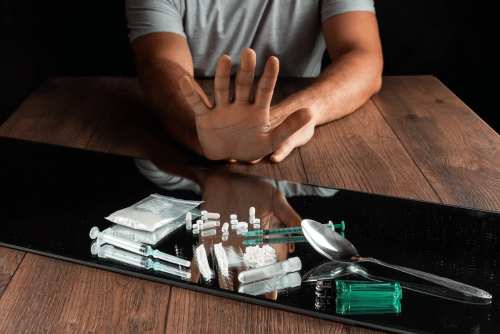

It can be incredibly frustrating and heartbreaking to watch someone you care about struggle with drug addiction. You may feel powerless and unsure of how to help them, especially if they are resistant to getting help. However, there are steps you can take to support and guide your loved one through addiction treatment without enabling their addiction. In this article, we’ll discuss how to help an addict who doesn’t want help and provide resources for finding professional assistance.
Before we dive into how to help people involved with a drug or alcohol addict who doesn’t want help, it’s important to understand the dynamics of addiction. Addiction is a chronic, relapsing disease that affects the brain and behavior. It’s characterized by compulsive drug-seeking and use despite harmful consequences.
Drug addiction alters the brain’s reward system, leading to a dependency on substances to achieve pleasure and avoid withdrawal. Repeated drug and alcohol use changes the way the brain functions, affecting judgment, decision-making, learning, memory, and behavioral control. Over time, addicts may prioritize drug use over other activities they once enjoyed.
Many individuals turn to drugs or alcohol as a way to cope with stress, trauma drug abuse, or mental health issues. These psychological factors can make recovery and the process of overcoming addiction even more complex, as they may need to address these underlying issues in order to recover fully.
A person’s environment, including their family life and dynamics, social circles, and socioeconomic status, can significantly influence their likelihood of developing an addiction. Additionally, genetics can play a role, with some individuals being more susceptible to addiction due to inherited traits.
Being able to recognize the signs of addiction can be crucial in getting help for your loved one. These signs might include changes in behavior, appearance, and social activities. Physical symptoms active addiction might also be present, such as weight loss, lack of hygiene, or withdrawal symptoms.
When trying to help a drug counselor or addict who is resistant to getting help, it’s essential to approach them with understanding and support, while also setting limits on treatment and taking care not to enable their addiction.
The first step in helping someone with drug addiction is to educate yourself about the disease. This will help you better understand what your friend or loved one is going through and how you can support them. Learning about the stages of addiction, withdrawal symptoms, and treatment options will provide you with the knowledge necessary to assist them effectively.
It’s natural to want to help someone you care about, but it’s important to avoid enabling their addiction. Enabling can take many forms, such as giving them money, using drugs, making excuses for their behavior, or bailing them out of consequences. While these actions may temporarily relieve some stress, they ultimately do more harm than good by enabling the addiction to continue.
Setting boundaries is crucial when trying to help someone with drug addiction. This means clearly communicating your expectations and sticking to them. For example, you may set a boundary that you will not give them money or allow them to use drugs in your home. Setting boundaries can be difficult, but they are essential for your own well-being and for helping your loved one seek treatment.
While you may want to be the one to help your loved one overcome their addiction, it’s important to recognize that addiction is a complex disease that requires professional treatment. Encourage your loved one to seek help from a therapist, doctor, or addiction specialist. If they are resistant, remind them that seeking help is a sign of strength and that they do not have to face negative effects and consequences of their addiction alone.

In some cases, an intervention may be necessary to get someone to accept help for their addiction and start treatment themselves. An intervention is a structured conversation between a person struggling with addiction and their loved ones, led by an interventionist. The goal of an intervention is to help the person see the consequences of their actions and the impact their addiction has on themselves and their loved ones and to encourage them to seek help.
An interventionist is a trained professional who guides the entire process. They help plan the logistics of interventions, coach family members on what to say, and ensure the conversation remains respectful and focused on positive change.
The primary goal of an intervention is to motivate your loved one’s refusal to enter a treatment program. The intervention team aims to achieve this by:
Highlighing the Impact of Addiction: Through sharing personal stories and experiences, the loved ones can illustrate how the addiction has negatively affected them and the addicted person.
Expressing Love and Concern: At its core, an intervention is an act of love. It’s crucial to convey your unwavering support and desire to see your loved one healthy and happy.
Offering a Clear Path Forward: The intervention should present a concrete treatment plan, outlining the next steps and available resources. This reduces feelings of overwhelm and removes barriers to seeking help.
If you’re considering an intervention, it’s vital to seek professional guidance. Addiction specialists or mental health professionals can assess your situation and help determine if an intervention is the best approach. They can also provide resources for finding a qualified interventionist.
Offering emotional support can be a powerful way to help someone who doesn’t want to admit they have an addiction. Listen to them without judgment, express your concerns in a non-confrontational way, and let them know that you are there for them unconditionally. This can help build the trust needed for them to consider seeking help.
Sometimes, traditional treatment programs may not appeal to your friend or family member enough. In such cases, exploring alternative therapies and interventions such as art therapy, equine therapy, or mindfulness practices can be beneficial. These therapies can provide a fresh perspective and may help in reducing resistance to more conventional treatment methods.
If your loved one is ready to seek help for their own addiction issues, there are many resources available to help them on their journey to recovery. Here are a few options to consider:
A therapist can provide individual or group therapy to help your loved one address the underlying causes of their addiction and develop coping strategies for managing cravings and triggers. Therapists can specialize in substance abuse and addiction counseling and offer tailored treatment plans to meet your loved one’s specific needs.
Support groups such as Narcotics Anonymous or SMART Recovery provide a safe space for individuals struggling in recovery to share their experiences and receive support from others who understand what they are going through. These can be invaluable in providing peer support and a sense of community.
Inpatient treatment center, or outpatient, treatment facilities and programs offer comprehensive support for individuals struggling with substance use disorders. These programs may include detox, therapy, support groups, and aftercare planning. Treatment programs often use a holistic approach to address and control both the physical and psychological aspects of substance use disorder.
If you are considering an intervention, an interventionist can guide you through the process and help you and your loved one prepare for the conversation. They are trained professionals who can help manage the dynamics of the intervention to increase the chances of a positive outcome.
Telehealth services have become increasingly popular and can be a great option for those struggling with addiction or mental illness who are hesitant to seek in-person help. These services provide access to professional help and treatment program through video calls and can be more convenient for some individuals.
Community-based programs such as local health departments, non-profit organizations, and faith-based initiatives may offer resources and a support group for individuals dealing with addiction. These can be more accessible and less intimidating for some people.
It’s important to remember that you as friends or family member cannot force someone to seek help for their addiction. It’s ultimately up to the addicted individual to make the decision to seek treatment. While you may be focused on helping your loved one, it’s crucial to take care of yourself as well.
It can be emotionally taxing to support a loved one’s addiction. Seeking therapy for yourself can provide you, family, and best friend with a space to process your feelings, learn coping strategies, and gain support from a mental health professional.
Engaging in self-care activities such as exercise, meditation, and spending time with supportive friends and family members can help maintain your well-being. It’s important to prioritize your own health and happiness while you seek support for your loved one.
Just as you set healthy boundaries with your family member regarding their addiction, setting personal healthy boundaries to protect your own well-being is essential. Know your limits and communicate them clearly to avoid burnout and resentment.
While it can be challenging and frustrating to help a drug addict who doesn’t want help, there are steps you can take to guide and offer support during your own or loved one ones drug addiction, without enabling their addiction. Remember to educate yourself about addiction, set boundaries, encourage them to seek professional help, and take care of yourself in the process. With the right support and resources, your loved one can overcome their addiction and live a healthier, happier life.